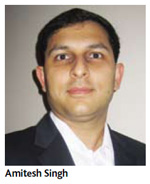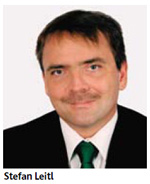Valeria C. looks at the myriad issues surrounding the compressors industry
While business growth in the region in the downturn is a key concern for compressor manufacturers, so is the approach adopted by end-users to installing the equipment, which they say, leaves a lot to be desired. Valeria Camerino looks at the myriad issues surrounding the compressors industry …
Saudi Arabia, Egypt, UAE and Kuwait represent the biggest markets in the region for both air conditioning and refrigeration, accounting for over 80% of the total business volume in terms of production and consumption. This is according to Amitesh Singh, Marketing Manager – End Users, Retails Solutions, at Emerson.
The company, which focuses on residential and commercial air conditioning, as well as commercial refrigeration, estimates the market size to be in the region of $350 to $375 million.
 Singh acknowledges that, like its competitors, Emerson reported a contraction in business volumes, as a result of the downturn. “Like everyone else, we also saw a slowdown, as many new projects were stalled and even cancelled,” he says. “The slowdown had an impact, but we believe we were also one of the first ones to come out of this downturn and have seen very good recovery since early 2010.” A key reason for business success, Singh said, was that the company continued to invest in new product technologies even during the downturn.
Singh acknowledges that, like its competitors, Emerson reported a contraction in business volumes, as a result of the downturn. “Like everyone else, we also saw a slowdown, as many new projects were stalled and even cancelled,” he says. “The slowdown had an impact, but we believe we were also one of the first ones to come out of this downturn and have seen very good recovery since early 2010.” A key reason for business success, Singh said, was that the company continued to invest in new product technologies even during the downturn.
Stefan Leitl, Managing Director, Middle East at German refrigerant compressor manufacturer, Bitzer, has also witnessed a challenging time, but the refrigeration business, he says, wasn’t much affected by the global financial crisis. However, he concedes that in 2009, business was slower compared to the previous year. “The market has picked up in 2010, the best year in our business,” Leitl says. “The first quarter of 2011 seems also promising.”
Although Leitl cannot quantify the size of the GCC compressor market, he points out that compressors are the main part of refrigeration and air conditioning systems. In addition to sales through distributors and OEMs, there are several suppliers from Europe and other regions serving the Middle East market, he says.
Two key areas of growth and perceived opportunity in the GCC are Saudi Arabia and Qatar. Although Emerson sees increasing opportunities in Saudi Arabia, the company feels the Qatari market hasn’t taken off yet. “I believe Qatar will see more projects and growth opportunities in the next few years, in the run-up to the FIFA World Cup as it gets ready with the required infrastructure,” Singh says.
Adds Leitl: “Business in Saudi Arabia and Qatar is growing. We already have dealers in these regions, and they are doing well. Moreover, many UAE-based contactors have expanded into these markets.”
 Emerson has already a distribution network in place for both Saudi Arabia and Qatar. The majority of its business is conducted through a distribution and contractors network; it directly deals with end users, along with a local partner, only for certain business services.
Emerson has already a distribution network in place for both Saudi Arabia and Qatar. The majority of its business is conducted through a distribution and contractors network; it directly deals with end users, along with a local partner, only for certain business services.
In keeping with its strategy of investing in new product technologies, Emerson is working with regional manufacturers to launch high-efficiency systems that would comply with the new local regulations that have come into play. Singh points out that high-efficiency scroll compressor condensing units, with specialised liquid/vapour injection technology, are gaining acceptance from both end users and contractors. “We have launched a range of digital compressors for air conditioning applications, which are getting popular as part of the VRF technology,” he says. Among them, Vilter is being introduced as a single screw compressor technology for industrial refrigeration and the only compressor to offer a 15-year bearing warranty.
As for Bitzer, it is currently undertaking a number projects in different areas of the refrigeration business. Leitl says that Bitzer has supplied refrigerant compressors for most of the hotel projects in the region. The company is also involved in a number of cold storage warehouse projects. Within the air conditioning segment, it sells its products through regional OEMs and several international companies, exporting their chillers to the Middle East.
What are the key magnets that draw clients to the products, though? In Singh’s opinion, end customers value energy efficiency and product reliability, and cost is not the only factor influencing the decision making. “Customer training and education play an important role,” he adds. “We do conduct regular training sessions, with support from our local partners in the region to create increased awareness.”
In his opinion, more needs to be done to educate end customers, contractors and channels on the product values. However, he explains that this approach is more effective for the refrigeration business than for the OEM side of the business, where price plays an important role after completing the product-approval stage. “We provide extensive training modules for customers in the region to make sure the products are applied correctly. Our trademark training session for trade customers, called COSS (Compressor Operation & Service Seminar) is very popular with our customers in the region,” he says.
The majority of Emerson products carry the mandatory quality and safety requirements defined in the developed economies. Additionally, the company carries out specific inspection and certification required for certain markets, such as Saudi Arabia. “We do not do any local tests on the compressors,” Singh explains. “All our compressors come factory-tested for quality, safety and reliability.”
Like Emerson, Bitzer also focuses on energy savings, in the words of Leitl. It also focuses on eco-friendly refrigerants, he adds. Bitzer manufacturers compressors with suction gas-cooled frequency inverters that can operate across a wide range of frequencies, and has also introduced a new series of reciprocating compressors, the ECOLINE series, optimised for medium temperature R134a applications.
With regard to screw compressors, it has launched a new CS3 series, as well as a new series of compressors for use with CO2 in both sub-critical and trans-critical applications. “You can find all kinds of customers in the market,” Leitl says. “Many of them focus on quality, and ‘Made in Germany’ is the first priority. If they use a cheap component it may also damage the compressor.”
With regard to regional installation practices, Leitl says that although there are many companies which hire qualified personnel to carry out the installations, there are also several technicians following wrong procedures.
Emerson’s Singh, who advocates for regional based testing centres for air conditioning systems to help enforce the new local regulations being currently implemented, believes that contractors and maintenance companies across the region should pay more attention to the installation of refrigeration products.
“We have taken up many initiatives to train and educate the contractors in the region on the right applications and best practices in the refrigeration business,” he points out. “We have incorporated several safety features in our refrigeration compressors and condensing units to overcome some of the application and installation issues.”
Copyright © 2006-2025 - CPI Industry. All rights reserved.